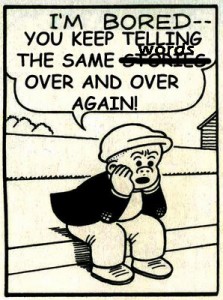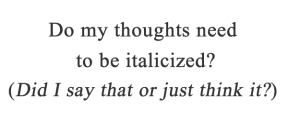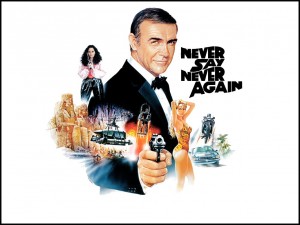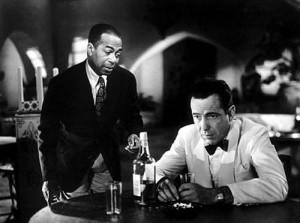Yes, I know it’s a conundrum. If you never say never, then how can you ever say never, even in telling someone to never say never? And Sean Connery, the greatest Bond EVER, did it again.
(If you liked that, you’ll get the section on repetition. If not? Eh, you might still enjoy it. And if you aren’t a Sean Connery fan, WHY???)
I’ve recently noticed a trend of people giving advice who are, in some ways, against people following advice. Just today I read a very useful guest post on Mystery Writing is Murder entitled “9 Pieces of Bad Writing Advice it’s Best to Ignore“. You should check it out, as Anne R. Allen really did dish up some nice nuggets of writing advice. However, as I read further into the post, my right brain kept elbowing the left, saying “Hey, man, you realize this is someone writing an advice blog about not taking advice, right?”
(My creative side, who loves to ogle over advice from the gurus of our wildly subjective craft, tried to ignore the protestations. He eventually gave in.)
I am going to address a few of Allen’s “rules”, only from the position that if you are less generalizing with your advice (and try to never say never, especially when you are contradicting advice that calls for “never”), you may lessen the chance that a writer will run off thinking “see, I KNEW that original advice was horse puckey!”:
(Ignore advice saying) “Eliminate all clichés.”
On the surface, I think this is too vague. Both the “original” advice and Allen’s advice to ignore it. I believe both are probably correct. Allen points out in her own “rule” that a character’s dialogue may need to contain clichés, citing Humphrey Bogart’s “doesn’t amount to a hill of beans” as one example. I couldn’t agree more. However, had Bogey’s character spent the entire film espousing tired cliché after tired cliché, the movie would have suffered (as would any interest in Bogey or his character).
So yes, use clichés where they are crucial to your character’s persona (and then only in the voice of the character, as Allen points out). However, also heed the spirit of the “original” advice: for the most part, excluding character speech or thought, clichés weaken work exponentially. So use them sparingly. And never in the omnipotent voice of the writer.
 (Ignore advice saying) “Avoid repetition.”
(Ignore advice saying) “Avoid repetition.”
This time Allen qualifies the advice to ignore advice with a “not necessarily”. Fair enough. She aptly cites H.W. Fowler’s warning to avoid “elegant variation”. (In simpler terms, use repetition where repetition best gets the job done—and don’t over-complicate the sentence.)
Allen’s example of good repetition:
“It was a good bull, a strong bull, a bull bred to fight to the death.”
Absolutely. Bravo. But let’s not lose sight of the sage advice to avoid repetition where it is bad, weak, and bred to put your writing to death.
My example: Repetition is bad. When I see repetition, I wonder why authors use repetition. Repetition, when not eloquently repeated, becomes repetitive and therefore falls solidly into the class of overused repetition. So don’t repeat, or use repetition. Unless it truly bears repeating.
 (Ignore advice saying you should) “Put your protagonist’s thoughts in italics.”
(Ignore advice saying you should) “Put your protagonist’s thoughts in italics.”
Allen points out here that italics are harder to read. Also that, when writing in the third-person-limited viewpoint, statements are read in the first person regardless. True. Both points, I suppose. But to imply italics should never be used for a character’s thoughts? I submit this follows the same “advice” we’re being told to ignore:
Non-specific, subjective, generalist advice.
All things in moderation, correct? There are times when italics (even used to represent character thought) serve an important purpose. They can break up an otherwise monotonous page of non-dialogue. They can be usede to emphasize on character’s thoughts over another. I admit—I do tend to abuse the heck out of them, so I promise, I do take Allen’s suggestion seriously. Cut back, yes. Don’t abuse them. I’ve written entire passages in italics—probably not a great idea. {cringes}. So I’ll remember her advice for the future.
But I will use them when I truly believe they work.
(See how I beat those italics into submission—brilliant, no??).
Seriously though, Allen’s written a wonderful post with mostly good advice. I’ve just become adverse to writing and conversations that leave me feeling like the information was mostly clear. Even Allen finds a way to sneak in some qualifiers here and there. Why not a few more detailed examples of “when to” and “when not to”?
A nit? Perhaps. But these delineations start to matter after a while. They are cumulative and over article after article muddy the waters.
I was listening to a fellow writer the other day who admitted not seeing Twitter for the great tool it can be until recently. This was in the context of said writer offering up marketing advice to the less-experienced. I mentioned LinkedIn, as I had just downloaded a seminar claiming this was a great resource many writers were dismissing out of hand. This writer promptly told me “I don’t see anything useful about LinkedIn” and summarily dismissed my comment, yes, out of hand.
I don’t mean to compare that dismissal with Allen’s article—only to say that I feel like I have been seeing more “do as I say” advice in these changing times, rather than a more open, tribal learning methodology. I’d simply like to see writing (and discussing) that more resembles what Aristotle had in mind:
“It is the mark of an educated mind to be able to entertain a thought without accepting it.”
Allen wrote a great piece with some tremendous tips. The contrarian element simply pushed my “need to say something about it” meter to the must blog level. That’s all.
I say take all advice (especially mine) with a grain of salt. But never say NEVER. Don’t accept any one person’s viewpoint as your own. At the same time, however, heed Aristotle:
Listen.
Take in all the information, whether you think you agree with it or not. I can learn more from listening to one person than blindly accepting a thousand doctrines.
Listening does not equate to acceptance. But neither does acceptance always equate to having listened.
~~~~~~~~~~~~~~~~~~~~~~~~~~~~~~~~~~~
The blank page is dead…long live the blank page.
~~~~~~~~~~~~~~~~~~~~~~~~~~~~~~~~~~~






Excellent thoughts Mr. Guthrie. I adore the Aristotle quote and have tried to live accordingly. To sum up your comments about the article, I would say you are suggesting to use these rules sparingly and skillfully and with instinct. Good advice. 🙂
Thanks, Kellianne! You summed it all up perfectly! ツ
Great advice about not blindly following advice about advice. Now my brain hurts. But seriously, you have to know the rules to break them. So knowing the flash points about fiction writing will let you think carefully when deciding to use or abuse them.
Thanks for reading and commenting, Tim. I agree…all the “rules” are great jumping off points. You definitely need to know them to abuse them correctly. 😉
Loved the blog. So you’re saying when reading about advice, don’t take all the advice you read or just take the advice you’re reading about and use it with a grain of salt. I understand and agree completely. One thing I do have to challenge you on however: Roger Moore was the greatest Bond ever.
I should never say never? Ever? It would be a hard thing to go forever to never say never, and if I ever did that, I’d never do it again….
You can say never. Just watch the repetition. ツ